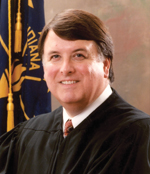
Upcoming Events Off-Campus Events: On-Campus Events: Reunions  |
The Hon. Randall T. Shepard '69: Some Core Judiciary ConcernsTuesday, February 26, 2008The Editor interviews The Hon. Randall T. Shepard, Chief Justice, Indiana Supreme Court.Editor's Note: In June of 2005, the
leadership of DRI-The Voice of the Defense Bar formed a task force,
chaired by John Trimble, to investigate issues facing the judiciary
across America. The task force determined that the most readily
identifiable areas of concern for the judiciary were 1) adequacy of
judicial salaries, 2) adequacy of court funding, 3) court security, 4)
unjust criticism of judicial opinions, and 5) judicial selection. These
five topics were the focus of the work of the task force.
Editor: Why did you decide to devote most of your life to being a judge? Shepard: I have been both a trial judge and an appellate judge. Each role is rewarding in its own way. As a trial judge, you have the chance to see individual litigants in person, to hear what they have to say, and at first hand to feel the importance of the matters that they bring to court. Most satisfying were the moments when you were able to rectify some malfunction or literally to right a wrong. It didn't happen every day, but it gave you the sense that you were putting your life to a good purpose. As chief justice, the rewards are quite different. The Supreme Court can effect systemic change across a rather large court system in a way that provides our trial judges with more such moments. In its appellate role, the Supreme Court can shape the evolving law of modern legal issues. It works hard to help our trial court colleagues in their work and put them in a position to offer a better quality of justice to the 6.3 million people in our state. Editor: How does inadequate funding for the courts affect the cost and outcome of litigation? Shepard: America's trial judges are the heroes of its justice system. They labor with very limited resources and do a remarkably good job with what they are given. The problem of adjusting the demands placed on judges to the available resources has the same result as it does in the private sector - it puts pressure on quality. In federal and state appellate courts, the problem of carrying a greater case load in the absence of a corresponding increase in the number of judges and expansion in court facilities has the effect of altering the amount of judicial thinking time that is applied to each case.
If you read descriptions of how federal courts handle what is called the
non-argument docket, what you see is that the relative balance between
judge and clerk and judge and staff attorney thinking shifts away from
the judge and toward the clerk or the staff attorney. The same
phenomenon happens in state courts as well. It poses very serious
questions for just who is making the decision. The judges sign their
names, but inevitably it shifts the balance between how much judge
thinking time and how much law clerk or staff attorney thinking time
goes into those decisions. |
 |
Powered by Bonfire™ - a Reunion Technologies Solution.

 In this interview, Chief Justice Shepard provides his insights with
respect to some of the topics covered by the Task Force in its report
entitled "Without Fear or Favor" (see link to the report in the version
of this article at
In this interview, Chief Justice Shepard provides his insights with
respect to some of the topics covered by the Task Force in its report
entitled "Without Fear or Favor" (see link to the report in the version
of this article at